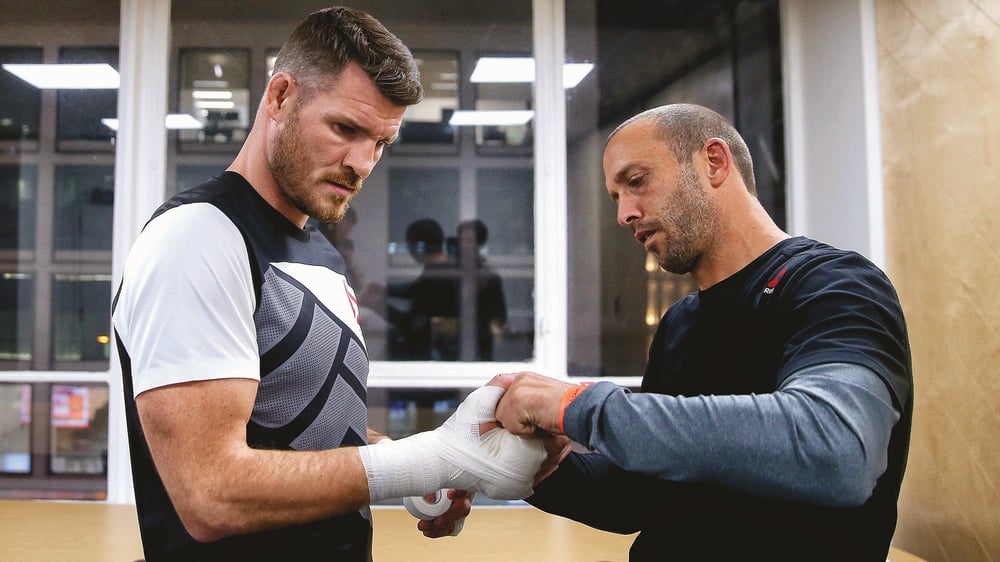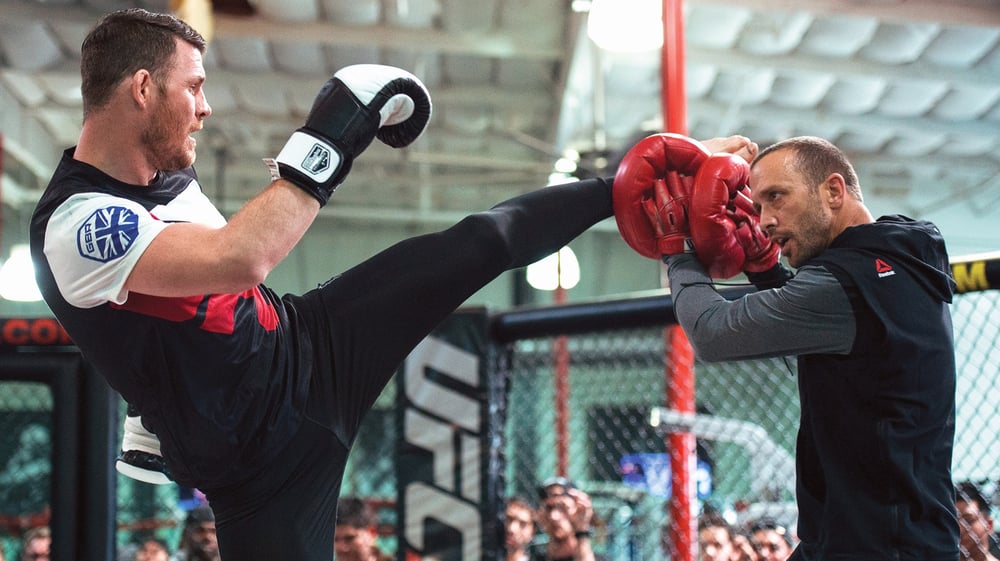
Issue 201
January 2024
During his fighting career, Michael Bisping was renowned for his legendary cardio. Now he’s retired, he’s helping people achieve their fitness goals through his involvement in UFC Gym, which is set to roll out more than 100 locations across the UK and Ireland over the next 10 years. Simon Head caught up with “The Count” to chat about his old-school fitness regimen, and how he’d do things differently if he was fighting today.
I remember you said to me, before your title fight with Luke Rockhold, that you realized that you were probably overtraining throughout a lot of your career. Then you had that very short prep for the title fight, and delivered the performance that you did. How did that affect the way you approached your fights after that?
It didn’t. It should have done. That was the plan. The plan was that I’m gonna learn from this and I’m not gonna overtrain, because the old mentality is that “more, more, more.” I was like, ‘If my opponent’s running three miles, I’m running five. If he’s sparring five rounds, I’m sparring six.
But, as my coach Jason Parillo said – and it’s so true – it takes confidence to take a day off. It takes confidence to be able to say, ‘You know what? I’m doing well. I’m ahead of the game,’ because pushing yourself to the limit every hour of the day, it’s a sign of weakness, it’s a sign of anxiety. So it takes confidence to take a day off. And after that, when I beat Rockhold, I was like, ‘This is how I’m gonna do it.’ But it wasn’t! I still continued to brutalize my body, and I’m paying the price for it today.

One of the hallmarks of your career was your gas tank, your cardio. All fighters need a gas tank. Everybody works on their cardio. So what was it that you did that set you above the others and made you the cardio king of the UFC at that point?
Yeah, I used to have a resting heart rate of 32 BPM. And every time I went for medical, they always thought I always had to do extra. I had to go off and see a specialist, and they were like, ‘There’s something wrong with your heart.’ And I said, ‘There isn’t! There isn’t! Trust me!’ I just worked really hard.
When I was a kid, I was in a kickboxing fight that I took on like a week's notice, and I’d just destroyed everyone up until that point. And then this time, it was an eight-round fight. I tried to finish him in the first round, didn't do it. The first four rounds I battered him. The next four rounds I was completely gassed, and he kicked the crap out of me! And you quickly find out that it’s the loneliest place in the world to be in a ring or an Octagon and having no gas tank, because it doesn’t matter how good you are, as soon as you’re tired, you’re done. It’s over. So yeah. Because of that, because of that lesson, that PTSD I had of that fight, I always pushed myself to the limit in my training.
So it was partly down to a mindset thing. But in practical, training terms, what was it that differentiated your approach to take your cardio over and above your rivals during your career?
People always asked me, what was the secret? I just did everything to intense levels. If I was hitting pads, I was doing it as hard as I can. If I was hitting the bag, it would be as hard as I can. Sparring, leaving it all in there. Running, when I was going for runs I’d be pushing myself to the limit, every single time. Being the first one to show up, and the last one to leave, consistently, every single day. And just effort. Hard work and effort. Everything was to maximum intensity.

You’re now heavily involved in UFC Gym, and promoting the benefits of the state-of-the-art facilities that are now available to the general public. In terms of your career, if you had access to the sort of facilities that UFC Gym is now providing for people today, how would that have affected you moving forward, and the way that you prepared and trained?
Well, for one, I wouldn't have overtrained. I would have recovered, because I would push myself to the limit, as I said, and by the end of it I’d just be in a pool of sweat on the floor. Then I’d just get up, shower, and leave. I didn’t stretch, I didn’t put a focus on recovery. There was no sauna, no ice bath, no cryotherapy or anything like that.
UFC Gyms have access to all of that state-of-the-art stuff. Also, there would be somebody who was monitoring my training, making sure I wasn’t overtraining, checking my heart rate levels, all those types of things. Having hard days, easy days – they call it green zone, amber zone, red zone. A bit more science would have gone into it.
But that’s just the evolution of the sport, too. There’s a lot more science involved now and certainly the Performance Institute in Las Vegas are very big on making sure people don’t overtrain and, obviously, that spills on to the UFC Gyms, as well. So, it’s just a more scientific approach, with a massive focus on recovery.
About UFC Gym
Bisping was in London to promote the opening of London’s first UFC Gym as part of an ambitious roll-out program that will see 105 gyms open across the UK and Ireland over the next decade.
The gyms feature programming that has been developed through exclusive access to the training regimens of UFC athletes, with those training techniques adapted and tailored to help provide members with everything they need to move, get fit, and live a healthy lifestyle.
Since the brand’s launch in 2009, UFC Gym has opened more than 150 locations in the United States, Australia, Bahrain, Canada, Chile, Mexico, Oman, Philippines, Taiwan, Vietnam, the United Arab Emirates, and Europe.
...









